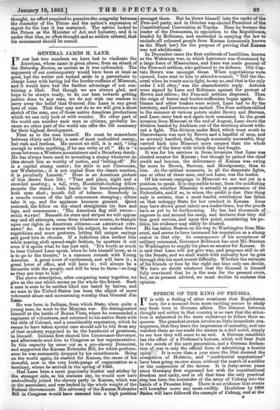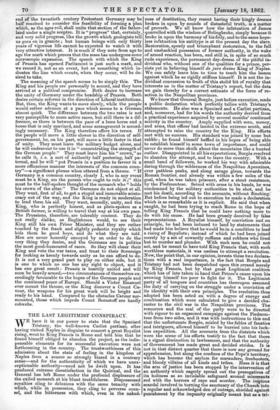SPEECH OF THE KING OF PRUSSIA I T is with a
feeling of utter weariness that Englishmen turn for a moment from more exciting scenes to study any fresh turn in German affairs. The distance between thought and action in that country is so vast that the atten- tion is exhausted in the mere endeavour to follow their se- quence. The grandest events involve so little immediate con- sequence, that they leave the impression of unreality, and one watches them as one reads the scenes in a dull novel, simply to see how they will come to an end. A German manifesto has the effect of a Professor's lecture, which will bear fruit in the minds of the next generation, and a German declara- tion oc war is only the official form of advertising a hostile °piny . It is more than a year since the Diet decreed the occupation of Holstein, and "confidential negotiations" have been going on ever since, without the march of a soldier or the suspension of the decree. It is forty-seven years since Germany first expressed her wish for constitutional freedom and unity, and in all that time the only practical step has been the surrender of the army of Coburg into the hands of a Prussian king. There is no evidence that events will hereafter move any more swiftly. Doubtless by 1900 Baden will have followed the example of Coburg, and at the end of the twentieth century Protestant Germany may be half resolved to consider the feasibility of forming a plan which, as the ages roll, shall unite that section of the father- land under a single sceptre. It is "progress" that, certainly, and very solid progress, like the growth which geologists tell us goes on in granite ; but human beings with only thirty years of vigorous life cannot be expected to watch it with very attentive interest. It is much if they note from age to age the mark which proves that the mass has undergone some microscopic expansion. The speech with which the King of Prussia has opened Parliament is just such a mark, and we record it, not as an event, but as something which in- dicates the line which events, when they occur, will be de- sired to take.
The meaning of the speech seems to be simply this. The King and his people are personally in accord, and they have arrived at a political compromise. Both desire to increase the unity of Germany under the headship of Prussia. Both desire certain reforms in the direction of Liberal institutions. But, then, the King wants to move slowly, while the people would rather advance at a pace which seems to a German almost quick. The difference between the two rates is not very perceptible to more active races, but still there is a dif- ference, as there is between the pace of a lame horse and a horse that is only spavined, and some arrangement is accord- ingly necessary. The King therefore offers his terms. If the people will move a little slower in the direction of self- government, he, on his part, will move a little faster in that of unity. They must leave the military budget alone, and he will endeavour to use it in "concentrating the strength of the German people." They must leave him his "crown," as he calls it, i. e. a sort of authority half pestering, half pa- ternal, and he will "put Prussia in a position to favour in a more efficacious manner the interests of the common coun- try"—a significant phrase when uttered from a throne. "If Germany is a common country, clearly I, who in any event must be a King, am the person who ought to rule it ;" this must be the half-spoken thought of the monarch who" holds his crown of the altar." The Germans do not object at all. They want, first of all, to get a stupid and immovable aristo- cracy out of the way, and the King is ready in moderation to lend them his aid. They want, secondly, unity, and the King, who is perfectly honest, and as plain-spoken as a British farmer, is willing to travel that way at his own pace. The Prussians, therefore, are tolerably content. They do not really dislike, as Englishmen would, to see their King still his own Prime Minister, and they are rather touched by the frank and slightly pedantic royalty which bids them be good boys, and do what they are told. Men are never honestly annoyed by an order to do the very thing they desire, and the Germans are in politics the most good-humoured of races. So they will cheer their King and vote the war taxes, and trust to their Sovereign for looking as keenly towards unity as he can afford to do. It is not a very grand part to play on either side, but it is one to which no one has any right to object, and it has one great result : Prussia is heartily united and will soon be heavily armed,—two circumstances of themselves ex- ceedingly favourable to the hopes of the German people and the continued peace of Europe. Should a Victor Emanuel ever mount the throne, or the King discover a Count Ca- your, the weapons for his great work will be bright and ready to his hand. Compared to the obstacles Cavour sur- mounted, those which impede Count Bernstoff are hardly cobwebs.































 Previous page
Previous page